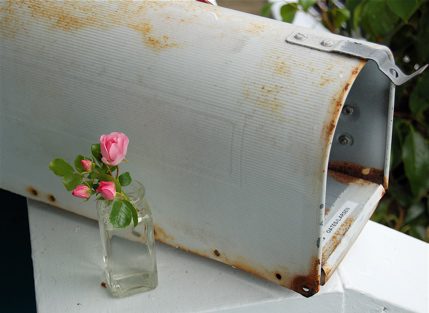This is my mailbox. Sad sight, isn’t it? Its door has fallen off and is tucked neatly inside—as if that will make a difference somehow. I’d say it’s in need of a replacement, wouldn’t you?
The hunt for a mailbox has been arduous. You would be surprised at what passes for a mailbox these days, and the prices people are bold-faced charging for them too! Evidently, the cheese factor is well established in the mailbox industry, which apparently is a subsidiary of the Garden Gnome industry. Scary!!
Sadly, the only one I’ve found that I adore is so pricey I’d be embarrassed to spend that kind of money for a mailbox—even if it is a hand-painted enameled piece from Germany. Call me frugal, but I don’t think your mailbox should cost more than your mortgage payment—or at least not my mortgage payment.
Oh how I tried to rationalize the expenditure. I really wanted that postbox. It was yellow. With red accents and the word “POST” in gold leaf. Oh my. But I was raised in a tradition that does not allow such frivolity—mostly because there was never money to consider it.
I hail from really poor folks. And not the “poor but my-do- we-have-pride” poor, but the “spent-my-last-dime-on-a-pint” poor. There is a difference, people. Some poverty can be avoided. And for what it’s worth, along with the penchant for alcohol came a craftiness that has to be admired, if only for its brazenness. We were poor but creative. Delusional and drunk, but we prefer to call it optimistic.
My grand-daddy was a sharecropper in his youth and I’m fairly certain he was drinking long before he was ever driving. One year when the crops were really failing, the farmer he worked for didn’t have the money to pay him his wages. Sharecropper are paid at the end of season, and when the time came the farmer only had store credit to offer my grandfather. Grandpa Joe, being who he was (A man named Jewell who went by Joe, he was no fool. Drunk, but not stupid) bought himself a new pair of shoes, pants, and a shirt. Then he took the remainder of his wages in sugar. He was 15, maybe 16 and there was no way the general store was going to be selling him alcohol.
He very quickly sold his lot of sugar to the local ‘shiner. (Moonshine!) Who gave my grand-daddy whiskey in return. Clever boy, yes? But, here is where you have to admire my grandfather—because most people would have stopped there. Not Joe. He then scrounged up Mason jars, diluted his whiskey with water, and sold the lot for more than the wages he spent on the sugar. It’s called a profit. Illegal, immoral, but ingenious!
I don’t know how much of that family fable is really true. But it’s just one of the stories we like to tell about the man, because the truth about Joe isn’t nearly as endearing. We want to admire the moxie in his youth because who he turns out to be in his adulthood leaves little to be admired.
I’m conflicted, of course. By the time I knew him, the anger and the alcohol had long left his system—replaced by Diabetes and the Parkinson’s that eventually killed him off. His heart exploded into bits one day and the only real memory I have of the man is his pressing quarters off on me for a kiss, “Grandpa Joe loves you baby, you know that don’t you? Grandpa loves you baby.”
I have no doubt that he did love me. That is the only “truth” I know about him. Yet, I also have no doubt that he was the mean son-of-a-bitch who abused and terrorized his children and wife. That truth, despite our fables, haunts us at the edges. We don’t get to escape it, even if we won’t dwell on it. It’s tucked away on the inside, a rusty door that serves no purpose any longer, but that we can’t, won’t throw out.
Joe wasn’t always rusty. He wasn’t always a drunk. It’s just that his hard-living,and I believe his anger, eventually caught up with him much sooner than it should have. But I also have no doubt he was that clever 15 year old, maybe 16 year old who turned a profit when the crops that year couldn’t. That boy name Jewell, who called himself Joe—a boy I never knew, but keep alive. That’s the Joe I tell my child about. That’s the Joe I choose to believe in. . . the fable I keep alive, with a rusty door tucked just inside.





Ohhh – I love this piece. GREAT story. Helps that it is as close to true as we can find. Boy, kids of an era ago and beyond really had interesting lives, didn’t they? You begin to realize that Tom and Huck weren’t completely made up – probably based on real kids. I know that Joe was a generation or two removed from that, but still…
___________________________________
Thanks… yeah, that Joe was a piece of work—a regular Tom Sawyer! ~W
Really a great afternoon story for a Friday!
I really enjoyed it 🙂
I just read a book by Jeannette Waters, The Glass Castle.
From your story about your family I think you’d love this book!
(It’s a memoir.)
___________________________________
Thank you! And I’ve read the book–it’s excellent. ~W
Wonderfully told, Wende. My grandfather didn’t drink much, but he did go through some very difficult times through the Great Depression. We talk an awful lot about children growing up too quickly now, but I wonder if generations of people had greater burdens put on their shoulders earlier in life than they typically do now.
If you weren’t allergic to paint, I’d suggest that you decorate your own mailbox!
_____________________________________
Heh, I actually found a post box–but I’ll post that on Monday. ~W
Every time I read one your family history stories, I’m sure we’re related.
This website: http://www.uglymailbox.com/ will help you avoid a big mistake. I live in fear that my mailbox will someday win a feature there.
_____________________________________
The way my family procreates, that’s entirely possible. :DÂ And your ugly mailbox site had me laughing. I sure hope my replacement doesn’t fall into that category! 😀 ~W
My mom’s dad was a temperamental, spoiled but hilarious and charismatic Italian dentist; I loved that man’s stories and would roll on the ground laughing. However, he was also verbally abusive and controlling of his family, and my mom has love/hate memories of him and the way he treated her mother. My maternal Nonna died at 50 of heart disease that would have been easily correctable a few years later. My dad’s dad was a brick mason and his mom a piano teacher. Neither one of them drank, and my paternal grandfather was a very taciturn Scot. He used to give us quarters to walk down the hill to the little drugstore for comic books. Thanks for bringing back the memories! About the mailbox–I’m not crafty, so I’d have to pay the price for a nice one. We have locking ones though, so it’s a non-issue these days.
_____________________________________
Well, I paid a price to let someone else be crafty—however, at a fraction of what the German import cost. Oof…~W
Something struck me about this piece that I couldn’t quite put my finger on. Then I read it again. There is pure poetry here. There’s a rhythm that is almost unnoticeable – and I wonder if you did it purposely. If you did, you’re a genius. If you didn’t – you have a gift. This is why I first began reading … and why I keep returning.
On the mailbox … buy it. Life is too short to deprive ourselves of beauty. 🙂
_____________________________________
Ah, the patter. Thank you. So many people read and identify with the content and that’s cool. But I always wonder if the patter comes through. Years ago, I took a class taught by my English mentor that was called, “Writing to be Read”–but because we all had to read our work out loud each week, it got dubbed, “Writing to be Read Aloud”. She is Southern too, and there is a distinct rhythm that comes with our speech, I think. I’m afraid the rhythm stuck with me—and only got enhanced with the preaching classes in Seminary. I don’t know that it’s genius or gifted as much as it is ingrained. I don’t know how to NOT do it, when I seriously write. But… it means a lot that you noticed because it took a lot of work to gain that rhythm, which I tend to think of as voice. 😀 ~W
Beautiful tale…both of my grandfathers died from problems resulting from alcoholism. The stories I’ve heard about them are quite funny escapades and adventures, but perhaps more mortifying if one was there when they were lived out.
One grandfather used to talk and argue with me, no one else would do this with him, and because I didn’t live close…I hardly saw him, and I loved arguing and telling stories with him…we used to have an invisible dog and monkey that always ran around the room and entertained us (then again, when you wake up at 6am and start drinking whiskey and water and chain smoke until you pass out at noon only to rise and do it until bedtime, I wonder if those things aren’t more real?)
The other did stop drinking by the time I was big enough for us to go off on our own adventures…and he let me play with all the electric fun stuff in his car (it was a new technology then) before he took me to the liquor store he owned and let me have 2 pieces of candy…he was also the one who ate stewed tomatoes in his soup and told me they were chicken hearts. My mom laughed when I fessed up just a few years ago, cause’ she never could figure out why I stopped eating stewed tomatoes (and really, these grandparents were from KY, so they were always eating unusual things)
I loved them both very much, and wish I had more time with them…no matter how rascally they were…
_____________________________________
Sounds like a book in the making, Saidra! ~W
Lovely post – thanks for sharing!
_____________________________________
You’re most welcome! ~W